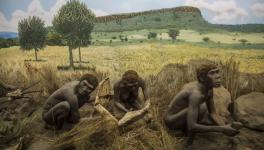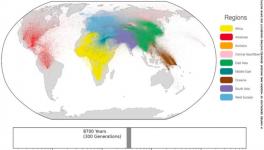Project Zoonomia Decodes Stockpiles of 240 Mammalian Genomes, Shed New Light on Human Evolution

Image Courtesy: Pixabay
New Delhi: The genome of any species is a hidden treasure. Decoding can reveal why some species share similar behaviour or how species differ and, of course, about species evolution. The discovery of the method of decoding the genetic codes of species by Frederick Sanger and others has provided molecular biologists and geneticists with an extraordinary tool, with the help of which many unknown facts about species and their evolution have come to light. The genetic code is the building block of life on Earth.
Advancing with it, scientists have now deciphered the genomes of 240 mammalian species, including that of humans. They have decoded the genomes of these species, and by comparing them, they learnt more about the smelling capability of some species, how some of them can hibernate and why some have developed larger brains. This enormous project is known as ‘Zoonomia’, and scientists have reported the findings in a series of articles published recently in Science.
The findings not only highlight the similarities among the genomes or the species but also how and when they diverged on the evolutionary scale spanning millions of years. Katie Pollard of the University of California, San Francisco, who is a part of the project and a data scientist, commenting on the findings, said in a statement—“This really wasn’t possible without this scale of data set before.”
In the early 2000s, scientists could decode the genomes of a few mammals—mice, human rats and chimpanzees. This enabled the scientific community to learn about mammalian evolution with more clarity. However, scientists realised that to get a clearer picture of evolution and shared genome portions across species, they need statistically significant data, at least more than 200 genomes of various mammalian species. And now, the new endeavour has brought out a large sum of data from which scientists could find out information with more precision.
The Zoonomia consortium consisted of above 150 scientists from different laboratories around the world and obtained the genomes of 240 species, the largest ever. Getting the genome sequences was the first step, scientists needed advanced data algorithms to make sense of the vast genomic data to compare among the species. They hypothesised that if segments of the genomes are similar across species and remained the same for millions of years, then this indicates that the segments are a ‘must’ for performing some critical functions.
In one of the analyses, the researchers found 10.7% of the human genome among all other species among the 240 they researched. Importantly, these conserved areas of the genomes are regulatory portions. Meaning they modulate the way other genes are expressed. It is worth remembering here that the genome is the totality of the genetic codes of a species. In the case of mammals, the DNA is the genetic material with four bases as its building blocks that are denoted with four alphabets—A, T, C and G. A gene is the portion of the DNA that directs the production of proteins. Various combinations of bases with various lengths form a gene; for example, a gene can be ATCGAT or AATTAACCGCAT.
Not only comparing the genomes, but scientists also estimated when the mammalian species diverged from their ancestors. Their estimation bolsters the hypothesis that mammalian species started diverging before a giant asteroid struck Earth, which led to the extinction of the dinosaurs. However, the mammals diverged more rapidly afterwards. Such efforts will also fortify the knowledge about many diseases, including cancer, whose imprints are present in the genomes.
Get the latest reports & analysis with people's perspective on Protests, movements & deep analytical videos, discussions of the current affairs in your Telegram app. Subscribe to NewsClick's Telegram channel & get Real-Time updates on stories, as they get published on our website.






















